Diplomatic Bluebook 2018
Chapter 2
Japan's Foreign Policy that Takes a Panoramic Perspective of the World Map
4 South Asia
(1)India
Geopolitically speaking India is an extremely important country as it faces the Indian Ocean connecting Asia and Africa and is positioned in the center of sea lanes. Moreover, India has the 3rd largest economy in Asia, with the world's 2nd largest population and a huge middle-income group. Japan and India are the two largest democratic countries in Asia, sharing common fundamental values, such as democracy and the rule of law, as well as strategic interests.
The Indian economy has been maintaining a high economic growth rate of around 7% since Prime Minister Modi took office in May 2014. In addition to the booming stock market, consumption and production have been increasing, and the foreign direct investment emphasized by Prime Minister Modi has also been rising steadily against a backdrop of deregulation.
In diplomatic relations, Prime Minister Modi has put forward active diplomacy through the “Act East” policy that promotes concrete cooperation in the Asia-Pacific region, thereby enabling India to gain more influence in the international arena as a global power.
Regarding relations with Japan in 2017, three summit meetings were held. In particular, Prime Minister Abe was invited to Gujarat State in September, where Prime Minister Modi comes from, during his third visit to India under the current administration. He was given an exceptionally warm welcome. Upon arriving at the airport, he was welcomed by around 50,000 people who lined the streets for 8 km. He attended a ceremony to launch the construction of the Mumbai-Ahmedabad High Speed Rail, and held a Summit Meeting for the tenth time with Prime Minister Modi. At the Summit Meeting, the Prime Ministers agreed to further promote coordination between Japan's “Free and Open Indo-Pacific Strategy” and India's “Act East” policy. They agreed to cooperate in connectivity, and defense equipment and technology, promote Japan-U.S.-India trilateral cooperation, continue support through ODA, promote the spread of Japanese education, and fundamentally expand tourism and people-to-people exchanges. Moreover, opinions were exchanged on regional affairs, including the North Korea issue, and the Prime Ministers agreed to maximize pressure on North Korea.
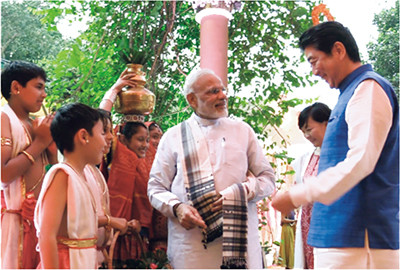 Prime Minister Abe and his spouse receive a warm welcome from Prime Minister Modi and local residents of India (September 13, Ahmedabad, India; Photo: Cabinet Public Relations Office (Prime Minister's Office of Japan Facebook Page))
Prime Minister Abe and his spouse receive a warm welcome from Prime Minister Modi and local residents of India (September 13, Ahmedabad, India; Photo: Cabinet Public Relations Office (Prime Minister's Office of Japan Facebook Page))(2) Pakistan
Pakistan is located in a strategic location connecting Asia and the Middle East. Thus, its political stability and economic development are essential for the stability and growth of the region. Pakistan is also the most important country in the context of international counter-terrorism measures. Furthermore, the country embraces a population of around 200 million, and approximately 60% of the total population is under 25 years old, thus making its economic potential high.
In security, Prime Minister Abbasi, who took office in August 2017, has decided to maintain the policy of former Prime Minister Sharif, identifying security improvement as a top priority. Since June 2014, the Pakistani military has conducted operations against armed forces including Tehrik-i-Taliban Pakistan (TTP), and the Government of Pakistan has announced that the number of terrorist incidents has been greatly reduced.
In foreign affairs, the former Prime Minister Sharif had been engaged in improving relations with neighboring countries including India, but after the terrorist attack on an Indian Air Force base in January 2016, India-Pakistan relationship has been tense. Furthermore, under the “All-Weather Strategic Cooperative Partnership,” relationship with China has been enhanced in a wide range of fields toward the construction of an economic corridor between China and Pakistan, which is an important constituent element of China's “Belt and Road” initiative. Regarding the relationship with Afghanistan, the Quadrilateral Coordination Group (QCG: with the participation of Pakistan, Afghanistan, the U.S., and China) has begun discussions on the peace and reconciliation process since January 2016, but there remain many issues to be addressed between the two countries, including border control, and refugee problems.
On the economic front, structural reforms have been completed under the International Monetary Fund (IMF) program since September 2013. Though there are remaining issues, such as further reduction of official debt, and increases in tax revenues, the growth rates in FY2016/2017 marked around 5%, making them the highest in the past ten years.
The year 2017 marked the 65th anniversary of the establishment of diplomatic relations between Pakistan and Japan, and in May, State Minister for Foreign Affairs Kishi visited Islamabad and Karachi. During the visit, he held meetings with the former Prime Minister Sharif and other leading figures to exchange views on efforts to further bolster bilateral ties, and on regional affairs. They also discussed measures to enhance economic ties through business associates in Japan and Pakistan.
(3) Bangladesh
Bangladesh, in which Muslims account for around 90% of the population, is a democratic country located in the Bay of Bengal and is geopolitically very important as an intersection between India and ASEAN.
The Awami League administration led by Prime Minister Hasina has been stable. However, a terrorist attack occurred in October 2015 in which a Japanese national was murdered. Moreover, another terrorist attack occurred in Dhaka in July 2016. Although measures to combat terrorism have been advanced by the security authorities, including through exposing Islamic extremist groups and setting up numerous checkpoints, the threat of terrorism still remains throughout the country. Furthermore, with the deterioration in peace and order in Rakhine State of Myanmar since August 2017, more than 600,000 displaced persons have flooded into the country, thus causing deterioration in humanitarian conditions.
On the economic front, the country, though classified as a least developed country, maintained a steady economic growth rate of around 7.24% in 2017, thanks to robust exports mainly of textile products. With a population of around 160 million people, Bangladesh has a production base with abundant low cost and high-quality labor, and the high potential of its market including considerable infrastructure demand is attracting attention. The number of Japanese-affiliated companies developing business in the country has increased from 61 (2005) to 270 (October 2016). However, the stable supply of electric power and natural gas as well as infrastructure improvement remain as challenges for foreign companies.
In the relationship with Japan, Parliamentary Vice-Minister for Foreign Affairs Takei visited Bangladesh in January, followed by visits of Parliamentary Vice-Minister for Foreign Affairs Iwao Horii, in September, and Foreign Minister Kono in November. A Ministerial Meeting was held with Foreign Minister Ali and it was confirmed that relations would be strengthened under the Japan-Bangladesh Comprehensive Partnership. In addition, Minister Kono took a tour of the camp of displaced persons who had flooded into Bangladesh from Northern Rakhine State of Myanmar.
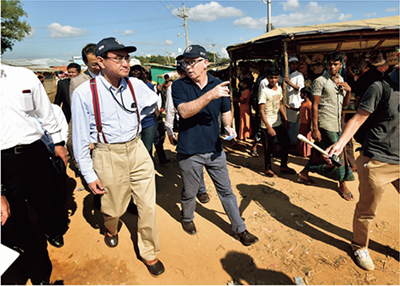 Tour of Kutupalong Refugee Camp (November 19, Kutupalong, Bangladesh)
Tour of Kutupalong Refugee Camp (November 19, Kutupalong, Bangladesh)(4) Sri Lanka
Sri Lanka is situated at a strategic point on the sea lanes in the Indian Ocean. The country is traditionally pro-Japanese and its geopolitical and economic importance is note-worthy. Since the end of the conflict in 2009, the security situation has greatly improved. Japanese tourists roughly quadrupled as compared with 2008 to over 40,000 (as of 2016).
In domestic politics, President Sirisena, who was elected at the presidential election in January 2015, maintained the grand coalition of the United National Party (UNP) and the Sri Lanka Freedom Party (SLFP) established after the general election in August the same year, and is running the Government together with Prime Minister Wickremesinghe (UNP).
The current administration set up a National Reconciliation Bureau to address this important task after the end of the conflict, and has been working in a variety of ways including the establishment of a mechanism consisting of a four-layer system to correspond to the investigation of the truth related to alleged human rights violations, rights for justice, rights for compensation, and prevention of recurrence of conflict.
After the end of the conflict, the economy of Sri Lanka was growing at an annual rate of 7%, and it continues to maintain an annual growth of over 4% in recent years. Its GDP per-capita was recorded at 3,887 US dollars in 2016, and given the geopolitical importance of the country and its access to the Indian market, an even higher growth rate is expected.
In the relationship with Japan, Prime Minister Wickremesinghe visited Japan in October 2015, and in April 2017 for the second time since the inauguration of the current administration. A Summit Meeting was held with Prime Minister Abe, and the Prime Ministers agreed to deepen and strengthen the Comprehensive Partnership, issuing a joint statement after the meeting. Furthermore, in November 2017, State Minister of Defence Wijewardene visited Japan and held meetings with Defense Minister Itsunori Onodera and State Minister for Foreign Affairs Nakane, to exchange opinions on further bolstering cooperation in the field of maritime security.
(5) Nepal
Nepal has geopolitical importance as an inland state between the great powers of China and India. For many years, Japan has been a major donor to Nepal and the two countries keep traditionally friendly relations through a variety of exchanges including between the imperial family and the former royal family, and through mountaineering.
In domestic affairs, Prime Minister Dahal expressed his intention to step down in May 2017, and Mr. Deuba, leader of the Nepali Congress (NC), was elected as the new Prime Minister in June, giving birth to a new administration. In 2017, to shift to the three-tiered administrative system of dividing Nepal into provinces, districts and municipalities, as enacted under the new constitution of September 2015, local elections were held in May, June and September, and the elections of the House of Representatives and Provincial Assemblies were held in December. For many years, Japan has been supporting Nepal to consolidate democracy, and Parliamentary Vice-Minister for Foreign Affairs Iwao Horii, was dispatched to ensure freedom, fairness and transparency of the elections of the House of Representatives and Provincial Assemblies held on December 7. The Japanese Government Election Observer Mission visited polling stations in the Kathmandu Valley: voting was carried out without major confusion in a generally peaceful manner. With the end of the elections stipulated by the new constitution, future political processes are expected to be carried out smoothly.
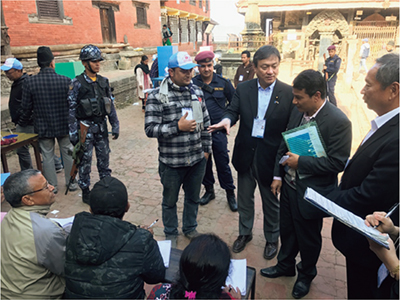 Visit to Nepal by Parliamentary Vice-Minister for Foreign Affairs Iwao Horii (December 7, Kathmandu)
Visit to Nepal by Parliamentary Vice-Minister for Foreign Affairs Iwao Horii (December 7, Kathmandu)In August 2017, Nepal's representative soccer team, which had experienced the earthquake in April 2014, was invited to Japan for an earthquake reconstruction exchange. The team visited environmental and disaster prevention facilities, and deepened understanding for related initiatives in Japan through experts. At the same time, they played a disaster relief friendly match with Vissel Kobe U-18 to disseminate cooperation between Japan and Nepal in striving to recover from the earthquake (See the Column “Cooperation with Sports Associations - Soccer Exchanges between Japan and Nepal”).
(6) Bhutan
Bhutan peacefully shifted from a monarchy to a constitutional monarchy in 2008. Currently, efforts are being made to establish a democracy under the Tobgay administration. The Government sets Gross National Happiness (GNH) as a guideline of the administration and is particularly working on economic independence, food production, and the reduction of youth unemployment rate under the 11th Five-Year Plan (until June 2018).
With regard to the relationship with Japan, since His Majesty and Her Majesty of Bhutan visited Japan as State Guests in 2011, bilateral exchanges have become active in a variety of fields and at various levels. His Royal Highness Prince Jigyel Ugyen Wangchuck, President of the Bhutan Olympic Committee, visited Japan in April to strengthen cooperative ties in the field of sports for the 2020 Tokyo Olympic and Paralympic Games. In October, Her Royal Highness Princess Sonam Dechan Wangchuck visited Japan to attend a forum organized by Kyoto University among other events.
In the area of economic cooperation, the two countries exchanged letters in December for grant aid of a maximum of 979 million yen under the Project for the Construction of a Disaster-Resilient Emergency Mobile Network. It is expected that this network will improve communication conditions to allow quick sharing of information in case of emergency and mitigate risks during natural disasters.
1. Japan Week 2017 in Bhutan
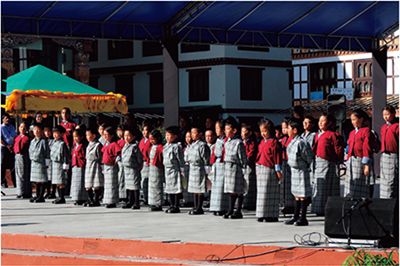 Singing of “Hana wa Saku” by Bhutanese children (June 2, Thimphu, Bhutan)
Singing of “Hana wa Saku” by Bhutanese children (June 2, Thimphu, Bhutan)Judo throwing techniques and Karate kumite demonstrations to powerful background music. Energetic voices of local children echoing under the blue Himalayan sky with the roar of loud applause of the audience each time a technique was demonstrated. The opening event of Japan Week was held at Clock Tower Square located in the heart of Thimphu, the capital of Bhutan, graced by Her Imperial Highness Princess Mako of Akishino and important Bhutanese Government officials including Foreign Minister Damcho Dorji. The symbolic opening event that marked the start of the four-day Japan Week from June 2 included Judo and Karate demonstrations presented by Bhutanese elementary and junior high school students, along with performance of a Japanese song ‘Hana wa Saku' by young students. In addition, a Japanese traditional performing arts group was invited to demonstrate the ‘Magisawa Kagura', an Intangible Folk Cultural Property of Ichinoseki City, Iwate Prefecture.
Bhutan is situated in a mountain range with large differences in altitude from a few hundred meters above sea level to 7,000 meters. The country has approximately the same land area as Kyushu Island and is home to a population of around 800,000. Some similarities can be found between Japan and Bhutan from idyllic scenes, formed mainly by rice cultivation, reminiscent of Japan's farm villages, to similar facial features of the two people, and to traditional dress such as “gho” and “kira” which look like the Japanese kimono.
The friendly relationship between Japan and Bhutan began through cooperation initiated by the agricultural expert the late Mr. Keiji Nishioka, dispatched by the Overseas Technical Cooperation Agency (now JICA) long before the establishment of diplomatic relations in 1986. Japan and Bhutan have established a very friendly relationship through mutual exchanges in various levels and fields including ones between the Imperial Family of Japan and the Royal Family of Bhutan. The year 2016 marked the 30th anniversary of the establishment of diplomatic relations between the two countries.
Japan Week has been co-hosted by the Embassy of Japan in India, the Japan Foundation, New Delhi, and JICA Bhutan Office since 2012 with the aim of promoting cultural exchanges and mutual understanding between the two countries given the long history of friendship. This year, Japan Week included events such as projection of Japanese short films at City Cinema in Thimphu as well as Japanese language teacher training and Japan workshop.
2. Royal Bhutan Flower Exhibition
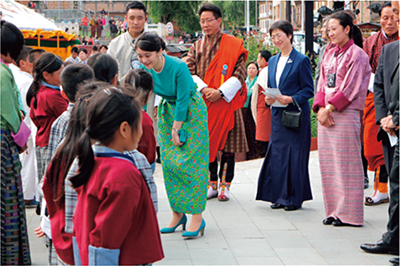 Her Imperial Highness Princess Mako of Akishino interacting with the performers following the event (June 2, Thimphu, Bhutan)
Her Imperial Highness Princess Mako of Akishino interacting with the performers following the event (June 2, Thimphu, Bhutan)On June 4, concurrently with Japan Week, the opening ceremony for the 3rd Royal Bhutan Flower Exhibition was held in Thimphu. Her Imperial Highness Princess Mako of Akishino attended the ceremony as the Guest of Honor at the invitation of the Government of Bhutan, together with Their Majesties the King and Queen of Bhutan as well as other members of the Royal Family and important government officials including cabinet members. Following the commemorative ceremony, Her Imperial Highness had a look around the beautifully decorated exhibition with colorful flowers, and observed the Japanese garden designed by a Japanese landscape designer and Bonsai collection provided by His Majesty the King.
The Royal Bhutan Flower Exhibition, launched in 2015 at the proposition of His Majesty the King, is a horticulture exhibition as a national memorial event held by the Ministry of Agriculture and Forests. The exhibition this time, held at National Memorial Chorten in Thimphu as a tribute to the late His Majesty the Third King, was inaugurated on June 4, the same date of Her Majesty the Queen's birthday. On this special occasion of particular importance to the Bhutanese people, the invitation extended to the member of the Imperial Family as the Guest of Honor symbolizes a close friendly relationship between the two countries.
The visit of Her Imperial Highness Princess Mako of Akishino was extensively reported not only in Bhutan but also in Japan, serving to further enhance the mutual interests of the two people. It is expected that the friendly relationship between Japan and Bhutan will be further deepened.
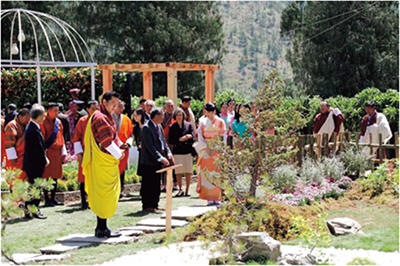 Her Imperial Highness Princess Mako of Akishino observing the Japanese garden (June 4, Thimphu, Bhutan, Photo: Royal Office for Media Bhutan)
Her Imperial Highness Princess Mako of Akishino observing the Japanese garden (June 4, Thimphu, Bhutan, Photo: Royal Office for Media Bhutan)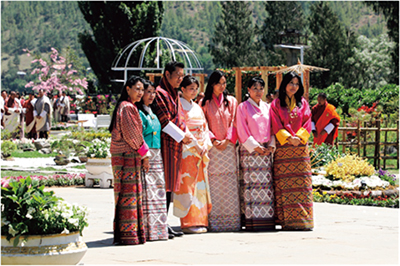 Commemorative photo with His Majesty the King of Bhutan and the members of the Royal Family (June 4, Thimphu, Bhutan, Photo: Royal Office for Media Bhutan)
Commemorative photo with His Majesty the King of Bhutan and the members of the Royal Family (June 4, Thimphu, Bhutan, Photo: Royal Office for Media Bhutan)(7) The Maldives
The Maldives is an island country in the Indian Ocean and its economic growth is mainly led by fishing and tourism, which account for about 30% of GDP. The country graduated from a least developed country in 2011, and its per-capita GDP reached approximately 9,792 US dollars, marking the highest in South Asia.
In domestic affairs, the administration has been relatively stable since President Yameen took office. However, a motion of no confidence was passed against the Speaker of the People's Majlis Maseeh in March and July 2017, under sustained cooperation between the four opposition parties, testifying to antipathy to President Yameen. Regarding foreign policy, importance has long been placed on relations with neighboring countries including India, but the country has recently been strengthening relations especially with Saudi Arabia and China. In December 2017, President Yameen visited China as a State Guest, and signed various agreements including a free trade agreement.
Regarding the relationship with Japan, 2017 marked the 50th anniversary of the establishment of diplomatic relations. In November, Foreign Minister Asim visited Japan to hold a Foreign Ministers' Meeting with Foreign Minister Kono. Moreover, Parliamentary Vice-Minister for Foreign Affairs Iwao Horii visited the Maldives to make a courtesy visit to President Yameen and Foreign Minister Asim, and attended a ceremony to commemorate the 50th anniversary of the establishment of diplomatic relations. During the meeting and courtesy visit, the two countries agreed to promote cooperation in a wide range of fields, including maritime security, disaster prevention, tourism, sports and culture. Furthermore, in commemoration of the anniversary, a performance was given by a Japanese drum group in Malé in October to promote active cultural exchanges between the two countries.

